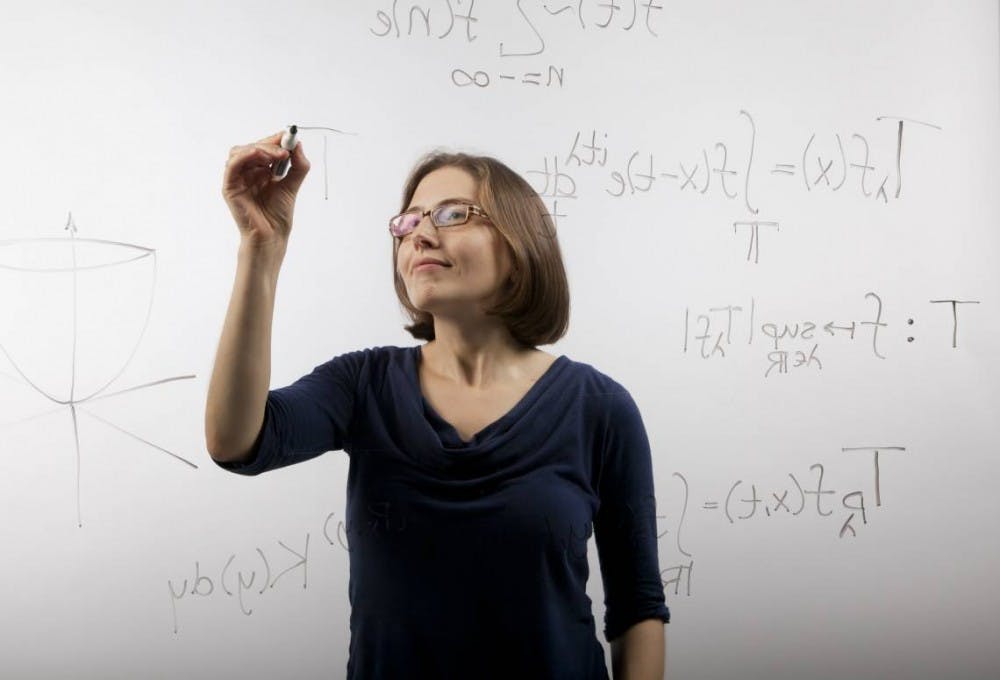Lillian Pierce first recognized the beauty of mathematics in college, when professors led her into the world of abstract math.
Now the Nicholas J. and Theresa M. Leonardy associate professor of mathematics at Duke, Pierce has been awarded the Joan and Joseph Birman Fellowship. The $50,000 fellowship is granted to mid-career women who excel in research in a core area of mathematics. Pierce conducts research in analytic number theory and is currently interested in Diophantine equations.
Most people are already familiar with one particular Diophantine equation, though they might not know it to be one—the Pythagorean equation, x^2 + y^2 = z^2.
“That equation has been well-understood for hundreds of years, in part because of its relationship to triangles,” Pierce wrote in an email. “But what about the equation x^3 + y^3 = z^3 or the equation x^4 + y^4 = z^4?”
These equations look simple, she wrote, but the difficulty comes with figuring out whether there are whole-number solutions to a particular equation.
“While the Pythagorean equation has many ‘interesting’ solutions like x=3, y=4, z=5, it turns out that the other equations mentioned above only have the ‘boring’ solutions, for example when x=z and y=0,” she wrote.
She explained that this has taken centuries to prove—mathematician Pierre de Fermat stated this fact in the 1600s, but it was only proved by Andrew Wiles in the 1990s. Today, she is researching whether other Diophantine equations have "interesting" solutions, and if so, how many.
“Often, a Diophantine equation encodes information about other important problems, so by counting these solutions, we can be learning about other objects in mathematics as well,” she wrote.
After graduating as valedictorian of Princeton’s Class of 2002, Pierce studied at Oxford University for two years as a Rhodes Scholar. She then returned to Princeton for her Ph.D.
Pierce’s interest in mathematics blossomed under the mentorship of Princeton University mathematicians such as Elias Stein. At Princeton, Pierce completed a pre-medical curriculum, but was also a mathematics major student fascinated by the math she learned about in her classes.
“Although I really loved all the science courses I took, I came to be especially fond of wandering around exploring the mathematical landscape, which these courses opened up for me,” Pierce wrote.
Pierce’s mentors encouraged her to look at problems that were “‘ripe’ and possibly ready to be solved,” she wrote. She added that working on a unsolved problem is exciting.
“While it is always frustrating to get stuck on a math problem, I don’t mind it so much if I think to myself ‘well nobody has ever gotten past this point before, so it’s fine that I’m struggling with it!’” she wrote.
Pierce joined Duke as a faculty member in 2014. She has won awards such as a Marie Curie Fellowship, a Sloan Research Fellowship and now a Birman Fellowship.
Pierce wrote that she will use the Birman award to alleviate academic duties and focus on other areas.
“I will use the Birman Fellowship as a funding source that temporarily reduces some of my other academic duties, so that next year I can have periods of time in which I can focus exclusively on research, and in particular on writing a book,” Pierce wrote.
The Birman Fellowship is an award “designed to fit the unique needs of women,” according to its website.
Pierce wrote that unfortunately, society tends to have a “rigid stereotype in mind” for how a mathematician “should” look or act. However, she wrote, anybody can learn how to do mathematics and can enjoy it.
“I’d like to see our society change from regarding math as a scary and mysterious subject that requires “genius,” to regarding math as a fun, approachable, and useful method for understanding the world around us,” she wrote.
Get The Chronicle straight to your inbox
Sign up for our weekly newsletter. Cancel at any time.

